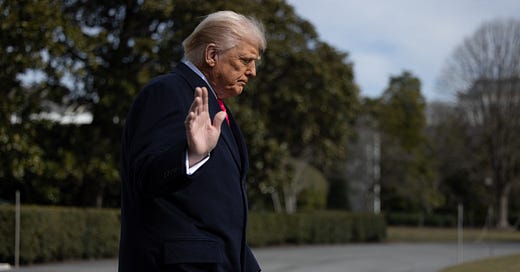
NINE OF THE LARGEST LAW FIRMS in the United States, hoping to avoid the president’s wrath, have reached agreements with the Trump administration committing the firms to various obligations. The first firm to pay fealty, Paul Weiss (where I worked in 1988 as a summer associate), was the subject of an executive order threatening to suspend security clearances, bar the firm’s lawyers from entering federal buildings, and limit its employees’ contacts with federal officials, among other plainly illegal requirements. The executive orders themselves may amount to criminal extortion.
While the law firm Perkins Coie (and later the firms Jenner & Block and WilmerHale) challenged an equally illegal executive order targeting it on First Amendment, due process, and other grounds, Paul Weiss’s chairman, Brad Karp, quickly cut a deal. Eight other firms then cut their own deals. Especially given the speed and ease of these capitulations, there is every reason to believe that the Trump administration will target many more law firms. According to the Wall Street Journal, Stephen Miller “crafted the framework for the orders” and Trump lawyer Boris Epshteyn, who is under indictment in Arizona, is managing the law firms’ surrender.
The firms have capitulated in an effort to avoid perceived threats to their revenue generation, ability to serve clients, and stability. They want to maintain profits per partner and forestall possible defections by clients and partners. Many of these firms derive a significant portion of their revenue—in some cases, perhaps most of it—from transactional and compliance work involving federal regulatory approval. When federal agencies are controlled by Trump loyalists, fear of retribution is rational. According to the New York Times, Karp said clients were concerned that even winning in court would leave Paul Weiss “persona non grata with the administration.”
Even assuming that these firms have made rational economic decisions, the firms’ leaders are deluding themselves if they believe that they have reached anything resembling final resolutions with the Trump administration. Each of the agreements provides that the firms will pay anywhere from $40 million (for Paul Weiss) to $125 million (for the four most recent agreements) for pro bono projects on which the firms and the Trump administration must “mutually agree.” How the firms may have imagined that these projects will be determined “mutually” is difficult to fathom. Perhaps the explanation, as Winston Churchill once put it, is simply this: “Each one hopes that if he feeds the crocodile enough, the crocodile will eat him last.”
The administration is poised to ensure that these pro bono agreements are administered for purposes that Trump deems fit. A “mutual agreement” means that the Trump administration has a say in what the work will be. Under the agreements, Trump has said, “the pro bono work would support initiatives like assisting veterans, members of the military, law enforcement and first responders, as well as ensuring fairness in the justice system and combating antisemitism.” The publicly reported agreements do not have defined boundaries. Trump even stated on April 10 that he is interested in using the firms to assist in trade negotiations relating to tariffs. As his press secretary has summed up the White House’s approach: “President Trump . . . looks forward to putting [the firms’] pro bono legal concessions toward implementing his America First agenda.”
How might that effort play out? Imagine the Trump administration finds a plaintiff who wants to challenge transgender rights and presents the plaintiff to one of the cooperating firms. The firm demurs on the facially nonpolitical grounds that the probability of success is low and the opportunity costs associated with the time investment are high. The administration declares that it disagrees.
What’s to stop the administration from repeating its previous threats and trying to hamper the firm’s ability to do legal work, represent clients, and make money? Even short of something as formal as another executive order, the administration has enormous leverage to make life miserable for the firm. And such a scenario will not occur as a one-off isolated incident. The administration’s effort to generate fear and anxiety will be unrelenting. At the same time, the law firms doubtless will think twice about handling either pro bono or full-fee cases that the administration may disfavor.
As Trump’s erstwhile ghostwriter has framed it, surviving in the world for Trump involves “a binary, zero-sum choice” in a “war” in which “you either dominated or you submitted.” Look at the events of the past three months alone. When the Trump administration announced a $400 million funding freeze for Columbia University (from which I graduated in 1984), the school’s administration chose to conciliate. But public concessions have led to still more efforts by the Trump administration to dominate. The latest humiliation is that the administration may seek judicial oversight of Columbia through a consent decree.
The administration’s shift-the-goalposts approach to Columbia should surprise no one. Extensive reporting in 2016 addressed Trump’s business affairs where, among many other things, his tactics reportedly involved “renegotiating deals for dimes on the dollar.” Karp can still take heed.
Perhaps these powerful, capitulating law firms will continue through the years to reach their revenue targets, avoid partner defections, and hire the associates they want. But no evidence suggests that they have reached any finality with the Trump administration. To borrow Trump’s words, the firms may be about to “go through some things.” The equity partners at the firms may emerge with their annual compensation relatively intact. But thanks to their capitulation, others will be worse off.

















